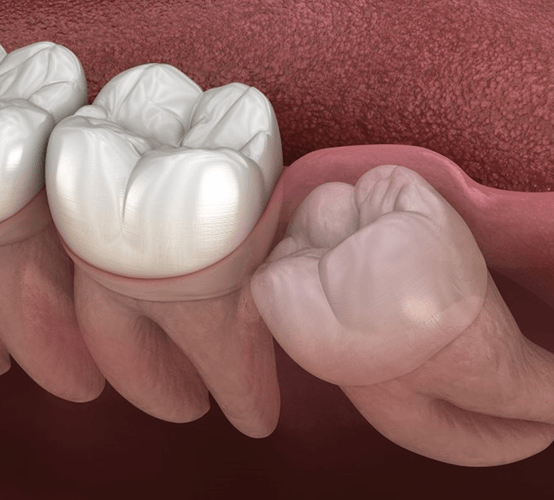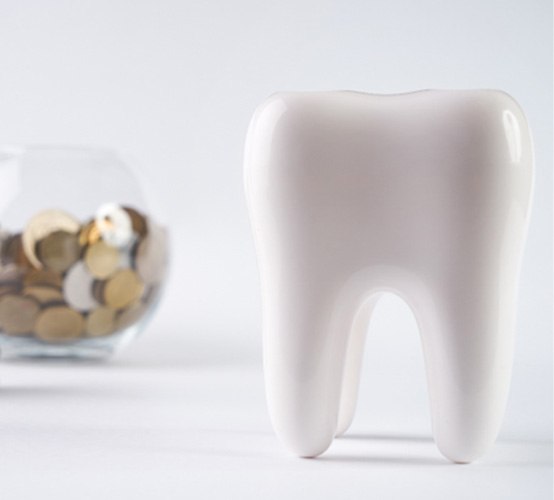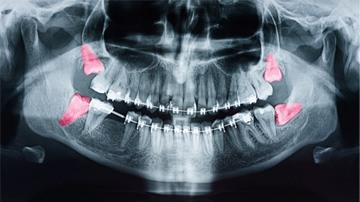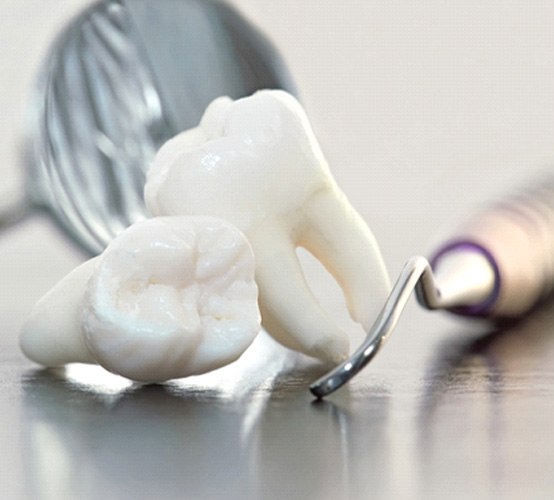Wisdom Tooth Extractions – Owasso, OK
Protecting Your Smile from Impacted Teeth
Although wisdom teeth were essential for our ancestors in the past, they aren’t as necessary for humans today. In many cases, people’s mouths today are much smaller and these final molars can often become impacted or stuck under the gum line. Since this usually causes discomfort or orthodontic problems later on, our team can provide wisdom tooth extractions to help preserve a patient’s smile. If you have these molars and they’re causing issues, feel free to give us a call to schedule your initial consultation!
Why Choose Infinite Smiles Dentistry for Wisdom Tooth Extractions?
- Offers Sedation Dentistry for Optimal Comfortable
- Utilizes State-of-the-Art Dental Technology
- Entire Process Performed Under One Roof
What Are Wisdom Teeth?

These pearly whites are typically the last set of molars that erupt in a person’s smile. The majority of people are born with four wisdom teeth—two on each arch. Humans in ancient times used to require these molars to help digest foods that were much tougher to chew, such as plants, seeds, nuts, and roots. They also didn’t have tools to process or prepare their foods like today, so they relied on the strength of their jaws and teeth.
Since our diet consists of softer meals and we have tools that make it easier to prepare them, we no longer need wisdom teeth for survival. For this reason, humans began to evolve with smaller jaws, leaving little room for these final molars to come out comfortably. In fact, some people are born with only some or none of these teeth.
Why Do Wisdom Teeth Need to Be Removed?

Your wisdom teeth will only need to be extracted depending on your specific situation. If they aren’t causing any serious discomfort or threat to your oral health, then you might not require this procedure. That said, there are potential problems that may occur further down the road if your wisdom teeth don’t have sufficient room, such as overcrowding, impaction, damage, discomfort, and heightened risk of forming cysts. Certain indications that you should get these molars extracted include:
- Jaw stiffness/soreness
- Discomfort while chewing
- Trouble opening your mouth
- Inflammation in the face or cheeks
- Infections of the soft oral tissue behind the final lower molar
- Bad breath
What to Expect from the Wisdom Teeth Procedure

The very first step of a wisdom tooth extraction is to completely numb your mouth with a local anesthetic so that you’re pain-free throughout the entire process. If your molars are already erupted, then we may be able to simply remove them using dental forceps and an elevator (a device designed to loosen pearly whites before extraction). Those that are impacted or not fully erupted might require an incision in the gums to reveal the teeth and jawbone. Our team may need to extract the final molars in pieces to make the process easier. Once this is done, we’ll clean the surgical site and then suture the gums closed, placing gauze over the area to control the bleeding and help develop blood clots for your recovery to begin.
Recovering from Wisdom Teeth Extraction

After finishing your procedure, you’ll be given a list of detailed instructions to follow during your healing process. It’s natural to experience some mild bleeding, bruising, discomfort, and swelling for a few days, but these symptoms should only be temporary. Your aftercare will also involve maintaining good oral hygiene, meaning you’ll need to brush and rinse your mouth gently to clean the area without disturbing the surgical sites. Stick to softer foods, use a cold compress, and take your prescribed/over-the-counter pain relievers as instructed to reduce discomfort. Should you notice any problems during recovery, notify our team right away for help.
Understanding the Cost of Wisdom Tooth Extractions

Often, wisdom teeth extractions are a cause of significant stress for patients, and trying to navigate finances makes that even more so. We want to make the entire process of treatment as comfortable as possible, which is why we make the process of getting dental care as easy as possible.
While we’re limited in what we’re able to tell you until we know more about the specifics of the situation, here’s what you should know about.
Factors That Can Impact the Cost of Wisdom Tooth Extractions

Like we just referenced, there are a variety of factors that can affect the overall price of the wisdom tooth extraction. Every person’s teeth are different, which means that every person will have different needs when it comes to this treatment.
For one, not everyone has all four of their wisdom teeth, and needing to remove less of them means the treatment will be less expensive. You may also have some wisdom teeth that have been impacted, which will involve more invasive surgery. This also contributes to the price.
Then there are the anesthetics and sedatives that are used for the procedure, along with any prescribed pain medication you would get after the treatment. You should keep these factors in mind when budgeting for the procedure.
Does Dental Insurance Cover Wisdom Tooth Extractions?

It isn’t necessarily a given that your dental plan will pay for dental surgery, but most will cover at least a portion of the procedure. Of course, this depends on whether you’ve met the deductible for the year, and whether you’re still below your yearly maximum. We’ll work with your dental plan to make sure that you’re getting the most of your coverage.
Wisdom Tooth Extractions FAQs

If you believe you should get your wisdom teeth removed, our Owasso dental team is ready to serve you. However, we understand that you might have some questions about the procedure. Continue reading below to find information about a few points that patients are often curious about. If your specific questions are not addressed here, give us a call. We will be happy to speak with you.
Why Are Wisdom Teeth Called That?
At first, it might seem counterintuitive to call the third molars “wisdom teeth” because they can cause so much trouble. However, their name does not stem from what they do. Rather, it comes from the fact that these teeth usually develop much later than the other teeth, when a person is older and “wiser” than they were earlier in life.
Does Everyone Have Wisdom Teeth?
Most people develop four wisdom teeth, one in each quadrant of the mouth. However, some people never develop any of their third molars. Others get one, two, three, or even five our more. How many wisdom teeth you develop depends largely on your genetics.
Also, keep in mind that even if you cannot see your wisdom teeth, you might still have them; they often stay stuck beneath the gumline. An X-ray can reveal how many of them you have. If you are still young, it is possible that you do not have wisdom teeth now but may get them in the future.
How Should I Prepare for My Wisdom Tooth Extraction?
Here are a few practical steps you can take before your procedure:
- Talk to us. Feel free to ask questions and express your concerns. We want you to go into your procedure with confidence!
- Stock up on soft foods. Your diet will need some temporary modifications after your appointment. You should have plenty of foods on-hand that require little to no chewing.
- Arrange for assistance. Depending on the type of sedation used for your procedure, you might need a trusted adult to drive you to and from our office. You might also need someone to help you with chores around the house for a few days.
How Do You Make Wisdom Teeth Pain Go Away?
The only way to permanently get rid of the pain associated with wisdom teeth is to have them extracted. Before your appointment, though, there are some things you can do to minimize your discomfort:
- Eat soft foods and avoid hard, chewy, and sticky items.
- Make sure to stick to a thorough oral hygiene routine.
- Swish with warm salt water.
- Apply an ice pack or cold compress to the side of your face for 10 – 20 minutes at a time.
- Take appropriate doses of over-the-counter pain medications.
- Use an over-the-counter topical anesthetic, such as Orajel.
